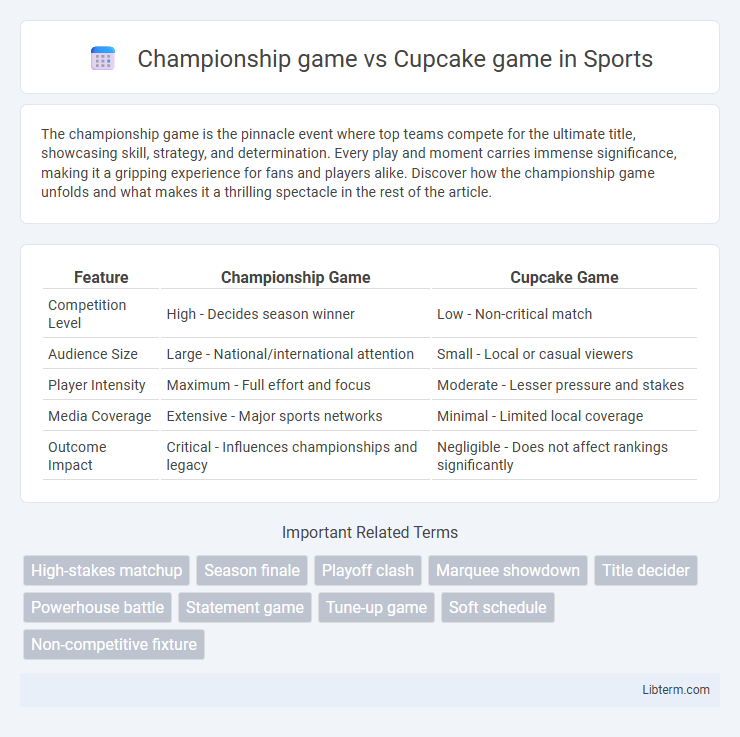The championship game is the pinnacle event where top teams compete for the ultimate title, showcasing skill, strategy, and determination. Every play and moment carries immense significance, making it a gripping experience for fans and players alike. Discover how the championship game unfolds and what makes it a thrilling spectacle in the rest of the article.
Table of Comparison
| Feature | Championship Game | Cupcake Game |
|---|---|---|
| Competition Level | High - Decides season winner | Low - Non-critical match |
| Audience Size | Large - National/international attention | Small - Local or casual viewers |
| Player Intensity | Maximum - Full effort and focus | Moderate - Lesser pressure and stakes |
| Media Coverage | Extensive - Major sports networks | Minimal - Limited local coverage |
| Outcome Impact | Critical - Influences championships and legacy | Negligible - Does not affect rankings significantly |
Understanding the Difference: Championship vs Cupcake Games
Championship games are high-stakes, competitive matches that determine the ultimate winner of a league or tournament, showcasing elite talent and strategic gameplay. Cupcake games, in contrast, refer to easier matchups often used for practice or confidence-building against less competitive opponents. Understanding this distinction helps fans and analysts better appreciate the intensity and significance of championship-level competition compared to routine or low-pressure games.
High Stakes: What Makes a Championship Game
A championship game features high stakes due to the ultimate prize on the line, often determining the season champion or awarding a prestigious title. Unlike a cupcake game, which offers low-risk, low-pressure competition, a championship game generates intense player focus, fan engagement, and media coverage because every play can dramatically impact the outcome. The heightened competitive atmosphere and significant rewards amplify performance levels, making championship games pivotal moments in sports seasons.
Cupcake Games Explained: Definition and Purpose
Cupcake games refer to simple, easy-to-play casual games designed primarily for entertainment and relaxation, often featuring straightforward mechanics and adorable, colorful graphics. These games serve the purpose of providing quick, enjoyable experiences without the competitive intensity or complex rules found in championship games, making them accessible to a broad audience. Unlike championship games that emphasize skill and competition, cupcake games prioritize fun and stress relief, appealing to players seeking light-hearted gameplay.
The Impact of Competition Level on Team Performance
Higher competition levels in championship games drive teams to optimize strategies, enhance focus, and elevate physical performance, resulting in more intense gameplay and sharper execution. Cupcake games, characterized by lower competitive stakes, often lead to reduced pressure and experimentation but can cause complacency and less rigorous effort. The disparity in competition intensity directly influences motivation, decision-making, and overall team dynamics, impacting performance outcomes significantly.
Fan Excitement: Championship Thrills vs Cupcake Blowouts
Championship games generate unparalleled fan excitement due to high stakes and intense competition, driving viewer engagement and emotional investment. Cupcake games often result in one-sided blowouts, diminishing spectator interest and lowering overall excitement levels. The dramatic tension and unpredictability in championship matches create a thrilling atmosphere unmatched by lopsided contests.
Scheduling Strategies: Balancing Championships and Cupcakes
Scheduling strategies for balancing Championship games and Cupcake games require careful consideration of player rest, competitive intensity, and fan engagement. Teams often allocate Cupcake games early in the season to build momentum and refine strategies without risking injury, while Championship games are scheduled for peak performance periods to maximize competitive fairness and media attention. Optimal scheduling balances physical demands and maximizes revenue opportunities through strategic game placement in the sports calendar.
Player Development in High-Pressure vs Low-Stakes Games
Championship games expose players to high-pressure environments that significantly enhance mental toughness, decision-making speed, and resilience under stress, critical for elite performance growth. In contrast, Cupcake games provide low-stakes settings ideal for experimenting with new tactics and skill development without the fear of failure, fostering confidence and creativity. Balancing both experiences accelerates comprehensive player development by combining stress adaptation with skill refinement.
Revenue and Attendance: Championship Games vs Cupcake Matchups
Championship games generate significantly higher revenue and attendance compared to cupcake matchups, with major events often attracting tens of thousands of fans and millions in broadcasting rights. For instance, NFL Super Bowl revenue exceeds $500 million per game, whereas non-competitive cupcake games typically draw fewer than 10,000 attendees and limited media coverage. The stark contrast highlights the economic and fan engagement disparities between high-stakes championships and low-profile, one-sided contests.
Media Coverage: Spotlight on Championship vs Cupcake Games
Championship games attract extensive media coverage, featuring prime-time broadcasts, expert analysis, and high-profile interviews that amplify fan engagement and sponsor visibility. Cupcake games, often viewed as less competitive, receive minimal media attention, limited to basic updates and seldom televised, resulting in fewer advertising opportunities. The stark contrast in media exposure influences public perception, revenue generation, and overall significance within the sports industry.
Long-Term Effects on Programs: Prestige vs Preparation
Championship games significantly enhance the prestige of sports programs by showcasing their success and attracting top recruits, media attention, and sponsorships. In contrast, cupcake games primarily serve as preparation opportunities, allowing teams to develop strategies and assess player performance without the pressure of high stakes. Over the long term, programs consistently participating in championship games build a stronger brand and elevated status, while those relying on cupcake games benefit from iterative growth and skill refinement but may struggle to gain national recognition.
Championship game Infographic

 libterm.com
libterm.com